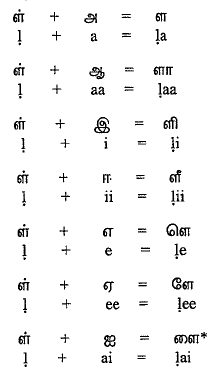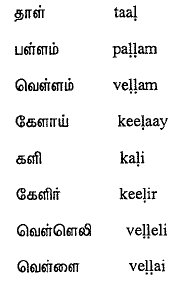Frame 12

![]() : In its production the dip of the tongue is slightly curved and made to contact the middle of the palate, that is hard palate. This air stream is completely blocked in the middle of the mouth. The soft palate is in raised position so that no air escapes through the nasal cavity. The air is allowed to pass by the sides of the tongue since they are not in contact with sides of the palate. The vocal cords are vibrated in this case. This sound is described as retroflex lateral.
: In its production the dip of the tongue is slightly curved and made to contact the middle of the palate, that is hard palate. This air stream is completely blocked in the middle of the mouth. The soft palate is in raised position so that no air escapes through the nasal cavity. The air is allowed to pass by the sides of the tongue since they are not in contact with sides of the palate. The vocal cords are vibrated in this case. This sound is described as retroflex lateral.
This occurs medially and finally. Medially it occurs as a single consonant in the intervocalic position, as the first member of consonant cluster and in an identical consonant cluster.
Familiarity with ![]() that is introduced in Frame 9 is to be compared here. This is pronounced by touching alveolar region with the tip of the tongue. But
that is introduced in Frame 9 is to be compared here. This is pronounced by touching alveolar region with the tip of the tongue. But ![]() is pronounced by taking back the tip of the tongue to hard palate. This
is pronounced by taking back the tip of the tongue to hard palate. This ![]() occurs word initial position whereas
occurs word initial position whereas ![]() is not.
is not.
Copy the letter five times. (see Appendix I for hand movements).
![]()
Observe how the secondary symbols for the vowels.
(See Chart II & Appendix II)

*In old Tamil secondary symbol for ![]() was
was
different from that of the present one for the
consonant, ![]() (see Chart III).
(see Chart III).
Read the following words.
